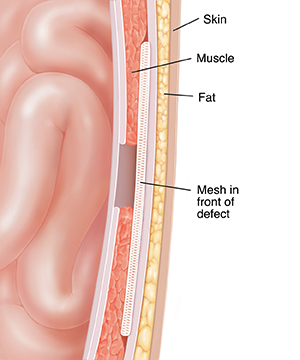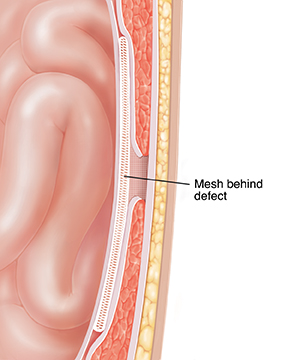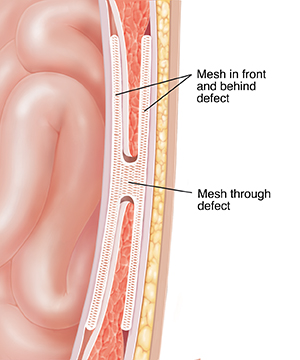Having Hernia Surgery: Patch Repair
Surgery treats a hernia by fixing the weakness in the belly (abdominal) wall. If an open repair is being done, a single large cut (incision) is made. This gives the surgeon a direct view of the hernia. The repair is then done through this cut. For a laparoscopic repair, a few tiny cuts will be made on your belly wall. Tiny tools will be passed through these cuts to fix the hernia. If your surgeon determines that mesh should be used to fix the defect, special mesh materials are used to patch the weak area. They make a “tension-free repair.” Follow your healthcare provider’s advice on how to get ready for the procedure. You can often go home the same day as your surgery. But in some cases, you may need to stay in the hospital overnight.
Getting ready for surgery
Your healthcare provider will talk with you about getting ready for surgery. Follow all the instructions you’re given. Be sure to:
-
Tell your healthcare provider about all the medicines you take. This includes both prescription and over-the-counter medicines. It also includes vitamins, herbs, and other supplements.
-
In general, stop taking nonsteroidal anti-inflammatory drugs (NSAIDs) 3 days before surgery, or as directed. These include aspirin, ibuprofen, and naproxen. But if you take aspirin, or other antiplatelet medicines, for a heart condition or a past stroke, talk with your providers before stopping them. Check with your healthcare provider about any other medicines you should stop taking before surgery. Ask when you can start taking them again.
-
Plan to have an adult family member or friend give you a ride home after surgery.
-
Stop smoking. Smoking affects blood flow and can slow healing. Smoking can also raise your risk for problems from anesthesia and surgery.
-
Gently wash the surgical spot the night before surgery. You may be given a special scrub to use.
-
Follow any directions you're given for not eating or drinking before surgery.
The day of surgery
Be at the hospital or surgical center at your scheduled time. You’ll be asked to change into a gown. You’ll then be given an IV (intravenous) line in your hand or arm for fluids and medicine. Shortly before surgery, an anesthesiologist or nurse anesthetist will talk with you. They'll explain the types of medicine used to prevent pain during surgery. You'll have 1 or more of these:
-
Monitored sedation to make you relaxed and sleepy
-
Local anesthesia to numb the surgical site
-
Regional anesthesia to numb specific parts of your body
-
General anesthesia to let you sleep during surgery
During the surgery
Most hernias are treated using “tension-free” repairs. This surgery uses special mesh materials to fix the weak area. Unlike traditional repairs, the tissue around the muscle that gives strength to the belly wall isn’t solely sewn together. Instead, the mesh covers the weak area like a patch. This fixes the defect without “tension” on the muscles. It also makes the hernia less likely to happen again. Sometimes, the mesh is made of strong, flexible plastic that stays in the body. Sometimes, the mesh is made of material that gradually absorbs into the body. Either way, over time, nearby tissues grow into the mesh to strengthen the repair.
 |
| Repair in front. |
 |
| Repair in back. |
 |
| Combination repair. |
After surgery
When the procedure is over, you’ll be taken to the PACU (postanesthesia care unit) to be watched. Your blood pressure, breathing, and heart rate will be monitored. You’ll also have a bandage over the surgical site. To help ease discomfort, you’ll be given pain medicines as needed. You may also be given breathing exercises to keep your lungs clear. Later, you’ll be asked to get up and walk. This helps prevent blood clots in the legs. You can go home when your healthcare provider says you’re ready.
Risks and possible complications
Hernia surgery is safe. But it does have risks, such as:
-
Bleeding
-
Infection
-
Anesthesia risks
-
Mesh problems
-
Inability to pee
|
|
Online Medical Reviewer:
Heather M Trevino BSN RNC
Online Medical Reviewer:
Robyn Zercher FNP
Online Medical Reviewer:
Ronald Karlin MD
Date Last Reviewed:
4/1/2024
© 2000-2025 The StayWell Company, LLC. All rights reserved. This information is not intended as a substitute for professional medical care. Always follow your healthcare professional's instructions.